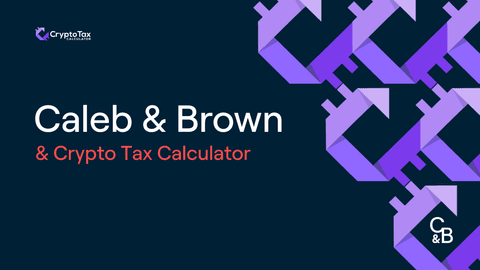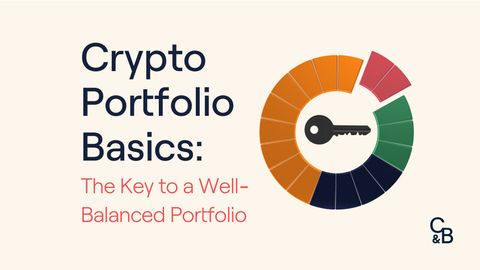Is Your Crypto Actually Taxable? A Guide to Crypto Taxation in US & Australia
Authored by: Crypto Tax Calculator Date: 12 January 2024
Disclaimer: In this article, we’ll cover a range of topics involving the cryptocurrency tax landscape in Australia and the U.S. While the article aims to offer you with the most up-to-date information, it’s important to acknowledge that the space is always evolving and the information may be subject to changes. Please note that this article is for educational purposes only and should not be construed as tax, financial or legal advice. You should seek out the help of a registered tax professional to obtain advice.
Cryptocurrencies have taken the financial world by storm, offering new opportunities for investment, payment, and financial freedom. However, the rise of these digital assets has also led to increased scrutiny from tax authorities around the world.
If you're a cryptocurrency investor, it's essential that you understand the tax implications of your crypto activities. In this article, we will delve into the complex world of crypto taxation, with a specific focus on rules relevant for US and Australian taxpayers.
Why Are Crypto Transactions Taxable?
In both the US and Australia, cryptocurrencies are not considered legal tender. Instead, they are treated like property for tax purposes, which also makes them an asset that is subject to capital gains tax (CGT). Therefore, when you buy, sell, trade, or use cryptocurrencies, you may trigger tax events that could give rise to a tax liability and obligations to declare those transactions.
Do Tax Authorities Know About My Crypto?
Over recent years, tax authorities have been utilising tracking tools and working with data companies to monitor cryptocurrency transactions. These services are able to link blockchain transactions from on-chain wallets back to a KYC’d exchange, creating audit trails which help authorities identify investors who are potentially trying to evade tax.
In Australia, the tax regulator (ATO) has a data sharing and matching protocol in place with digital currency exchanges, which is cross-referenced with information held by the ATO.
So whether you’re investing through a centralised exchange, brokerage, or dabbling with on-chain wallets (e.g., using Metamask), tax authorities will be able to track your transactions. If you fail to properly report your crypto activities or pay related tax liabilities, you may face compliance action, interest on unpaid amounts, penalties for failing to declare the transaction, or even criminal charges.
Merely being unaware of tax regulations won't suffice in dealings with tax authorities; therefore understanding the obligations associated with your crypto holdings is crucial.
Capital Gains Tax
In both the US and Australia, the following activities are subject to capital gains tax:
- Selling crypto for fiat (e.g., selling XRP for USD)
- Trading crypto for crypto (e.g., selling BTC for ETH)
- Trading non-fungible tokens (NFTs)
- Using crypto to purchase goods and services
- Assuming it is not a personal use asset
The capital gain of each transaction can be calculated by simply subtracting the cost base from the proceeds received.
If the proceeds you receive from selling your crypto or NFT is greater than its cost base (that is, the price of the crypto asset when you acquired it), you will have a capital gain. Conversely, if your cost base exceeds your capital proceeds, this will result in a capital loss.
Australian-Specific Rules
The following activity triggers a capital gains tax event and is specific to ATO tax rules:
- Gifting crypto to a friend, family member or a random third party
NOTE: Even if you didn't receive any fiat currency or crypto assets in return for the gift, this rule still applies.
50% CGT Discount
In both the US and Australia, if you hold your crypto asset for more than 12 months, you may be eligible for a 50% capital gains tax discount.
For example:
Suppose you purchased 1 ETH for $5,000 on June 1, 2022. Then, on September 1, 2023, you decide to sell it for $8,000. As you held the ETH for over twelve months, you're eligible for a 50% discount on your capital gains. Here's how the capital gain is calculated:
Capital Gain = (Capital proceeds - Cost base) x CGT Discount Rate Capital Gain = ($8,000 - $5,000) x 50% = $1500
So, you realise a capital gain of $1,500, which is subject to tax. Without the 50% discount, your taxable capital gain would have been the full $3,000 ($8000 - $5000).
Tax Loss Harvesting
Tax-loss harvesting is a legitimate investment tactic to lower your annual capital gains and, consequently, your tax liability. This involves selling your crypto assets at a loss to decrease the overall capital gains for the year. This loss can then be applied against your gains, potentially leading to a reduced tax bill.
For example:
David buys 1 BTC at $55,000. He holds it for a while before deciding to sell it at a value of $52,000. In this scenario, David has made a capital loss of $3,000. In the same financial year, David also buys 1 ETH for $1,000. ETH’s value goes up from $1,000 to $5,000. Seeing this increase, he decides to sell and David has now made a capital gain of $4,000. David can use his capital loss of $3,000 to offset the capital gain of $4,000. Therefore, he will now only pay CGT on the remaining $1,000.
Wash Sale Rules
You might be wondering, "Why doesn't everyone do this and buy back assets at a lower price?"
Enter: wash sale rules. These rules apply when an investor sells an asset at a loss during market dips and quickly repurchases it. This strategy allows the investor to claim a capital loss while keeping their original assets. It may sound appealing, but tax authorities have regulations in place to prevent abuse.
Tax regulators in various countries, including Australia and the US, enforce these regulations known as the wash sale rule.
Australia
In Australia, the wash sale rule encompasses a 61-day timeframe, spanning 30 days prior to the sale and 30 days following it. Any capital losses incurred through matching transactions within this timeframe cannot be utilised to offset or claim against capital gains.
US
In the US, wash sale rules may not apply to crypto as the IRS categorises it as property, not a stock or security. This allows you to sell your crypto at a loss and repurchase it within 30 days while still recognising a capital loss. However, it's essential to satisfy the IRS "economic substance doctrine", meaning there must be a genuine economic change for a transaction to claim a tax loss. If you sell and swiftly rebuy without any time or price fluctuation, the IRS might view it as lacking "economic substance" and disallow the loss.
Income Tax
In both the US and Australia, the following activities trigger income tax liabilities:
- Staking Rewards & Yield Farming
- Airdrops
- Mining as a business
- Hard Forks
- Salary Paid in Crypto
- Selling NFTs for a living

Staking Rewards, Yield Farming & Airdrops
The rewards obtained through staking, yield farming and airdrops are considered as income from existing property and are therefore subject to income tax.
Mining & NFT Businesses:
If you operate a crypto asset mining business or create and sell NFTs as a business endeavour, the tokens you receive are considered part of your business income.
Receiving Crypto for Work Performed (e.g., Salary or Wages)
In the modern business landscape, it's becoming increasingly common for companies to remunerate their employees with cryptocurrency. These crypto-based earnings are considered as ordinary income and are therefore liable to income tax based on their value at the time of receipt.
NOTE: In the above cases, any subsequent disposals of the received crypto assets could give rise to CGT consequences.
US-Specific Rules:
The following activity triggers an income tax event and is specific to IRS tax rules:
- Mining as an individual
NOTE: If you engage in mining as a personal hobby, any tokens you mine will be subject to taxation based on your income bracket. When you later dispose of the mined coins, whether for another cryptocurrency or fiat currency, you'll be liable for capital gains tax.
Non-Taxable Events
Both the US and Australia recognise certain events as non-taxable:
- Buying crypto with fiat money (e.g., purchasing ETH with USD)
- Transferring crypto between wallets or accounts you own
- Receiving crypto as a gift
- Rebranded tokens (e.g., LEND —> AAVE)
- Soft forks
- Staking deposits and withdrawals
- Putting crypto up as collateral
Australian-Specific Rules
The following activities are viewed as non-taxable when the crypto asset is received and are specific to ATO tax rules:
- Initial Allocation Airdrops
- Mining crypto as a hobby
NOTE: In cases where a project initiates an airdrop with tokens that aren't yet traded (i.e., the tokens are not live), you won't face immediate income or capital gains upon receiving them. Instead, you'll incur Capital Gains Tax (CGT) when you decide to sell them. If the tokens were received for free, your cost base is zero. However, if you paid to acquire the airdropped tokens, the amount you paid becomes the cost base.
NOTE: For individuals mining as a personal endeavor, there are no immediate tax consequences. However, capital gains tax applies when you eventually sell the mined coins, with a cost base of $0.
US-Specific Rules:
The following activity is viewed as non-taxable and is specific to IRS tax rules:
- Gifting crypto less than $15,000 (USD equivalent) to a single person within a given tax year.
NOTE: If you gift someone more than $15,000 (USD equivalent) within a given tax year, you need to report this using Form 709.
How to Calculate Your Crypto Taxes?
Now that you have a solid understanding of the fundamental crypto tax rules, how should you approach the calculation of your crypto taxes? Your choice of method may depend on transaction complexity, volume, and your budget for managing your crypto tax obligations.
Option 1: Do-It-Yourself Manually
This choice is primarily viable for individuals with minimal trading activity and quickly becomes exceedingly challenging for anyone dealing with over 100 transactions. The process typically entails gathering transaction data from all exchanges and wallets, followed by manual calculations of capital gains and income for each transaction.
Option 2: Hire a tax professional
Consider hiring a crypto tax specialist like an accountant or CPA for personalised guidance. If you're short on time or unsure about the tax implications of your activity, this option is valuable. Keep in mind that professional services come at a cost - in which case, the last option may suit you best.
Option 3: Use a Crypto Tax Calculator
Due to its automation, crypto tax software tends to be more efficient and cost-effective than manual calculations or hiring a tax professional.
This tax season, Caleb & Brown has teamed up with Crypto Tax Calculator, a leading crypto tax software trusted by over 250,000 clients globally. Crypto Tax Calculator is an all-in-one solution for investors and traders in 20+ countries (including the US and Australia), supporting 1000+ exchanges and wallets, (including Caleb & Brown). The platform automates data collection, categorises transactions, calculates capital gains, losses, and income, and offers tax-loss harvesting options which may reduce your tax liability.
Disclaimer: This assessment does not consider your personal circumstances, and should not be construed as financial, legal or investment advice. These thoughts are ours only and should only be taken as educational by the reader. Under no circumstances do we make recommendation or assurance towards the views expressed in the blog-post. The Company disclaims all duties and liabilities, including liability for negligence, for any loss or damage which is suffered or incurred by any person acting on any information provided.






